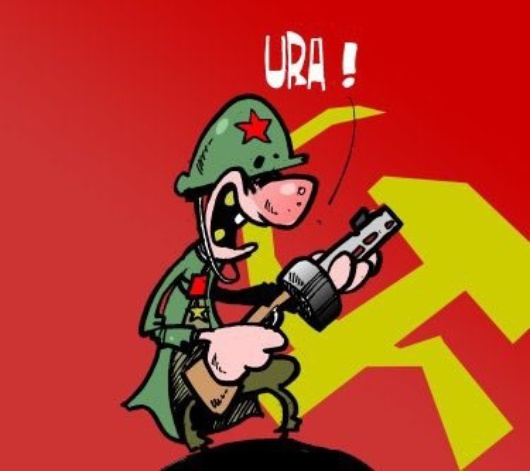Portal manipulates information about Holocaust survivor
Published on
I'm really worried how the way certain news are presented in the most popular news portal Delfi fuels tensions in the society and perpetuates harmful stereotypes. Unfortunately, it seems that some journalists of the portal consciously exploit the emotional undertones of the messages they spread, in search for scandals and subsequent profit.
Today Delfi published a story about the decision of the German government to grant the Federal Cross of Merit "for special merits in pursuing reconciliation between Germans and Jews in Central and Eastern Europe" (approximate translation). Thanks to one reader, I got the description of the Order and the list of people awarded. They are those who excelled in sports, politics, economy, etc. Thank you for the links!
What is important is the way Delfi presents this decision. The headline of the article reads: "In Vilnius, Germany awarded a red partisan figuring in a mass slaughter case". How is that? Further the article claims that Ms. Fania Brancovskaja was a member of one of the pro-communist partisan groups which is documented as having killed 46 civilians of Polish ethnicity in the village of Koniuchy/Kaniukai and subsequently setting the village afire. The article reminds that the case of the annihilation of the village for its rebellion and refusing to supply food to the partisans is under investigation by the Prosecutor General. Although there is no evidence that Ms. Brancovskaja was present during the slaughter, the article has this amazing quote: "Formally she is 'clean', but, according to lawyers, a member of a gang [sic!], even if not taking part in the criminal act concerned, still remains a member of the gang". Huh? What kind of legal category is that? What does it imply? That every member of a "gang" should go to jail? That they are automatically guilty and responsible? What can be considered a gang? Are members of political parties or youth movements punishable for criminal acts of other members? This statement was made in a country where a former speaker of the parliament was found dining with a mafia leader, and participants of a neo-nazi march on the independence day were not punished. But whatever, this quote is simply ridiculous.
Some more important points here:
Some quick reminders. Delfi would certainly refute all charges of anti-semitism. At best (worst?), it could possibly admit being 'anti-Jewish-lobbyist', whatever that would mean. Their use of illustrations, headlines and even mistranslations of several articles (for example, a line in the saying that "Jews also suffered from the deportations of June 1941, aimed at the bourgeoisie of all races" was into Lithuanian as "... Jews suffered [from Soviet deportations]" - an obvious factual mistake with the potential to trigger public discontent over such a presentation of facts about the society where Soviet crimes are still a bleeding wound) can easily be interpreted as a conscious editorial choice, if not policy. In every case journalists create the image of a powerful lobby that interferes into the affairs of independent states. The graspable 'between the lines' position of certain journalists is hidden behind seemingly innocent filtered backgrounders and illustrations. In most cases we read about 'groups of Jews', 'Jewish NGOs', or, in this case, 'American and Israeli Jews', but at best find out their names and titles in the background section of the articles. As a 'moderate socialist and radical democrat' :) , I strongly believe that nobody represents any people or group as a whole unless appointed to do so within an assigned realm through democratic election. Some Delfi journalists seem to think the opposite - people's actions are supposedly representative of those who happen to share the same identity. Of course, this does not apply to Lithuanians, as the portal exhibits a wide variety of their opinions.'Red', used in the title, has the same emotional connotation as in the US. It has a strong emotional overtone and provokes hate. Especially with this illustration Photo from Delfi The article 'reminds' of the murder case as a background, although last year Ms. Brancovskaja was plead unguilty due to 'insufficient evidence' by the Prosecutor General. The award is presented as an 'insult to Lithuania', yet its title is only written in the bottom paragraph. As I said, I know nothing of the award, but it seems that it is not for any war-related merits. Ms. Brancovskaja (87), survivor of the Vilnius Ghetto, who joined the anti-Nazi movement at the age of 20, is active in teaching about the Holocaust. Even if the Lithuanian government wants Germany to be more sensitive and discreet about her membership in the pro-Soviet partisan movement, that does not deny her contribution to Holocaust education. The Delfi staff writers stress that the case in which Ms. Brancovskaja was called as a witness was closed due to international pressure from "American and Israeli Jews". This is a semi-factual statement, to which there are two important points. First, the international pressure was provoked by the fact that the case was investigated with unprecedented zeal in a country that still fails to punish Nazi collaborators. This unbalance was exactly what raised eyebrows abroad, and not the fact that "a Jew is called to trial", as the journalists try to present it. No surprise that this kind of presentation arouses furious comments from the readers: "why do THEY have impunity???" Second, the criticism came from very concrete organisations and institutions, it was not a petition signed by random Jews in the USA and Israel (possible that petitions were also circulated, but that did not influence the work of the Prosecutor General). This de-personalised and de-institutionalised use of 'Jews' contributes to fuelling anti-semitism in the society and circulation of conspiracy theories. Many, maybe the majority of the persons who expressed criticism against the charges against Ms.Brancovskaja independently or on behalf of the institutions they were entitled to represent could have been Jewish, but is it of fundamental importance?




